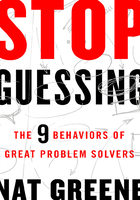

CHAPTER 1
Stop Guessing
I never guess. It is a shocking habit—destructive to the logical faculty.
—SHERLOCK HOLMES, IN SIGN OF THE FOUR
Unlike Mr. Holmes, the rest of us guess sometimes. When we face something that’s broken or any problem in our lives, our frontal cortex lights up with one or dozens of ideas of what might be wrong and how to fix it. We might jot these down and quickly get to work.
Guessing is a natural brain function. In our evolutionary history, humans had to quickly make decisions with very limited information. We had problems such as “What tool should I use to deal with this saber-toothed tiger trying to separate me from my larynx?” Spending time studying your problem and finding the root cause behind your unfortunate conundrum was a behavior that natural selection quickly pruned from our family trees thousands of years ago.
And that natural tendency to guess is reinforced throughout our lives. In school, we are rewarded by teachers for being the first to raise our hands with a guess to the answer of a question. In order to promote self-esteem, teachers reward wrong answers, too: “good guess!” We’re discouraged from simply saying, “I don’t know.”
In business we also naturally default to guessing. We’re encouraged by others who crave quick action when problems arise—regardless of the quality. Spending hours staring at data or a broken machine can be seen as slow or lazy, whereas the employee that “rolls up their sleeves” and immediately tries something is seen as heroic.
I don’t know when I first came across this issue, but the first example I can recall was while I was in a factory in Georgia. A piece of equipment had broken down, stopping the production line. A mechanic spent 8 hours changing a half-dozen parts until he got it back up and running. After production was back online, he told a story that has become very familiar to me: “I ripped it open and changed out this part, but that didn’t fix it. And I also had to change this other part, and then…” He was celebrated by the leadership team for his tenacity and effort, but nobody asked whether he could have brought the plant online much faster by actually investigating what the root cause was. And it seems highly unlikely that four or five parts all failed at once.
This isn’t problem-solving. It’s solution-guessing. Truly solving the problem involves understanding what’s wrong and why it happened, through investigation and understanding—not by spending days or weeks testing different guesses until, hopefully, one works.